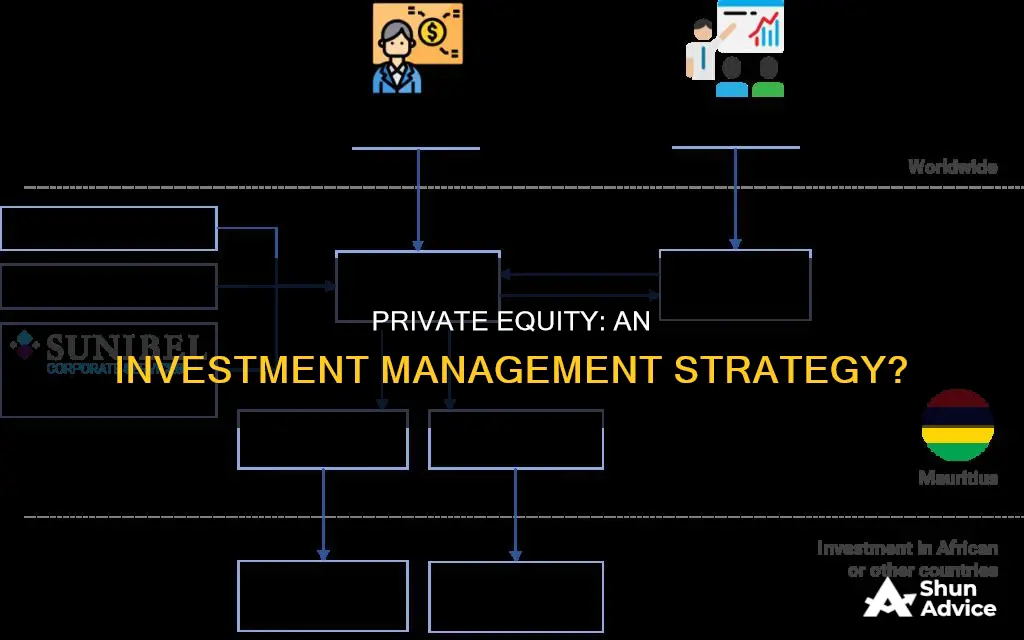
Private equity is a type of investment management that involves buying and selling companies that are not publicly traded. Private equity firms are investment partnerships that buy and manage companies with the goal of reselling them for a profit. These firms operate on behalf of institutional and accredited investors, who are typically required to commit significant capital for several years. Private equity is often considered a subset of alternative investments, alongside venture capital and hedge funds. The industry has grown rapidly, particularly when stock prices are high and interest rates are low, and has attracted scrutiny for its impact on employees, communities, and public services.
What You'll Learn

Private equity firms buy and sell companies
Private equity firms are investment partnerships that buy and sell companies. They raise capital from institutional investors, such as pension funds, and wealthy individuals, to purchase and manage companies. The goal is to increase the company's value before selling it for a profit.
Private equity firms may acquire private or public companies in their entirety or as part of a consortium. They typically do not hold stakes in companies listed on stock exchanges. The firms implement various strategies, such as leveraged buyouts, venture capital investments, and growth capital, to improve the performance of the companies they acquire.
The process of buying and selling companies by private equity firms involves the following steps:
- Deal Origination and Transaction Execution: Private equity firms develop relationships with M&A intermediaries, investment banks, and other professionals to identify potential acquisition targets. They assess the management, industry, financials, and valuation of the target company before making an offer.
- Portfolio Oversight and Management: Private equity firms provide operational support to the acquired company, helping them improve strategic planning, financial management, and implementing new systems to increase the company's value.
- Cost-cutting and Liquidations: Private equity firms focus on maximizing returns for their investors, which may involve implementing operational improvements, expanding the market reach, or innovating products and services. They may also take more aggressive approaches, such as asset liquidation, cost reduction, or imposing debt on the acquired company.
The decision to buy and sell companies by private equity firms is driven by the goal of maximizing returns for their investors. They aim to identify undervalued or under-managed companies, increase their value through various strategies, and then sell them for a profit. This process can lead to significant financial gains for investors but may also have wider effects on employees and communities, as the firms often implement cost-cutting measures and lay off employees.
The Investment Savings Curve: A Guide to Financial Strategy
You may want to see also

Private equity is a long-term investment strategy
Private equity firms raise capital from institutional investors such as hedge funds, pension funds, university endowments, and high-net-worth individuals. They then purchase ownership stakes in companies, usually mature companies with operating cash flows, using a combination of equity and debt financing. The use of debt financing increases the investment's return on equity by reducing the amount of initial equity required to make the purchase.
Private equity firms often implement a leveraged buyout strategy, in which they acquire a company with the use of financial leverage. They may also employ strategies such as distressed securities, venture capital, growth capital, and mezzanine capital.
Private equity is a risky investment strategy, and investors are typically required to commit significant capital for years. However, it offers the potential for higher returns than public equity markets and is, therefore, an attractive option for institutional investors and high-net-worth individuals.
Building a Solid Investment Portfolio with a $2,000 Foundation
You may want to see also

Private equity firms are investment funds
Private equity funds have a finite investment term, usually between 10 and 12 years, during which the invested capital is not available for withdrawal. The funds generally start distributing profits to investors after a few years, with the average holding period for a portfolio company being around 5.6 years. The investment strategies employed by private equity firms vary and may include venture capital, leveraged buyouts, distressed investing, growth equity, and sector-specific investments.
One of the key characteristics of private equity firms is their focus on long-term investment opportunities. They often target undervalued or under-managed companies where they can implement operational improvements, restructure operations, or develop new strategies to increase the company's value before exiting the investment. This "buying to sell" strategy allows private equity firms to maximize their returns by capitalizing on the increased value they create within a set time frame.
The fee structure of private equity firms typically includes performance and management fees. Performance fees are usually calculated as a percentage of the profits returned to investors, while management fees range from 0.5% to 3% of the private equity fund's size and cover operational expenses.
In summary, private equity firms are investment funds that specialize in acquiring, managing, and selling companies to generate profits for their investors. They play a significant role in the financial industry by providing capital and expertise to struggling or mature companies, often resulting in increased competitiveness and value creation.
Building a Robust Investment Portfolio: Where to Start?
You may want to see also

Private equity firms are active investors
Private equity firms are active in other ways, too. They are often involved in the following:
- Providing operational support to management to help build and grow a better company
- Providing managerial expertise and financial backup to financially struggling companies
- Implementing new technology and entering additional markets
- Making operational improvements, expanding market reach, and innovating products and services
- Restructuring, including cost-cutting, headcount reduction, and corporate governance restructuring
- Acquiring companies through leveraged buyouts, distressed securities, venture capital, growth capital, and mezzanine capital
- Raising their own funds, and therefore competing with investment banks to buy good companies
- Walking young companies' executive staff through strategic planning and financial management practices
- Instituting new accounting, procurement, and IT systems
- Aligning the interests of company management with those of the firm and its investors
- Imposing debt on acquired companies, which is later repaid using the company's cash flow or by selling its assets
Investment Management Fees: VAT Exempt or Not?
You may want to see also

Private equity firms are involved in leveraged buyouts
LBOs are often viewed as a ruthless and predatory business tactic as the target company's assets can be used as leverage against it, and the acquiring company can purchase a much larger company with relatively few assets of its own. The high debt burden can also lead to insolvency if the acquired company cannot generate sufficient cash flow to service the debt.
However, LBOs can create value for investors and drive growth in target companies. PE firms aim to improve efficiency, increase revenue, and reduce costs to enhance the cash flow generation potential of the acquired company. They also implement strategic initiatives and financial engineering to create value.
Exit strategies for LBOs include selling the company to a strategic buyer, conducting an initial public offering (IPO), or recapitalizing the company to distribute cash to investors.
Can I Deduct Investment Management Service Fees?
You may want to see also
Frequently asked questions
Private equity firms invest in and gain ownership of companies that are not publicly traded, with the goal of reselling them for a profit. They often partner with entrepreneurs who need more resources and expertise to execute their business growth ideas. On the other hand, asset management companies help individuals and organisations manage their investment portfolios by acquiring, trading, and managing investments to increase their value over time.
Private equity firms serve three critical functions: deal origination and transaction execution, portfolio oversight and management, and cost-cutting and liquidations. They identify and develop relationships with M&A intermediaries and investment banks to find lucrative deals. They also work with management to improve operations and increase earnings. Additionally, they may implement cost-cutting measures, sell off assets, or impose debt on the company to maximise returns for investors.
A common exit strategy for private equity firms is to sell a middle-market company, which they have grown and improved, to a large corporation for a significant profit. They may also exit through an initial public offering (IPO) or alternative options like a resale.







